|
|
|
Sort Order |
|
|
|
Items / Page
|
|
|
|
|
|
|
| Srl | Item |
| 1 |
ID:
121029
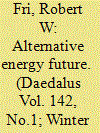

|
|
|
| 2 |
ID:
121032
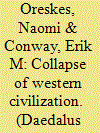

|
|
|
|
|
| Publication |
2013.
|
| Summary/Abstract |
Science fiction writers construct an imaginary future; historians attempt to reconstruct the past. Ultimately, both are seeking to understand the present. In this essay, we blend the two genres to imagine a future historian looking back on a past that is our present and (possible) future. The occasion is the tercentenary of the end of Western culture (1540 - 2073); the dilemma being addressed is how we - the children of the Enlightenment - failed to act on robust information about climate change and knowledge of the damaging events that were about to unfold. Our historian concludes that a second Dark Age had fallen on Western civilization, in which denial and self-deception, rooted in an ideological fixation on "free" markets, disabled the world's powerful nations in the face of tragedy. Moreover, the scientists who best understood the problem were hamstrung by their own cultural practices, which demanded an excessively stringent standard for accepting claims of any kind - even those involving imminent threats. Here, our future historian, living in the Second People's Republic of China, recounts the events of the Period of the Penumbra (1988 - 2073) that led to the Great Collapse and Mass Migration (2074).
|
|
|
|
|
|
|
|
|
|
|
|
|
|
|
|
| 3 |
ID:
121038
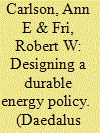

|
|
|
|
|
| Publication |
2013.
|
| Summary/Abstract |
Although the U.S. energy system seems to resist the changes necessary to meet today's challenges related to energy security and climate change, the system has gone through massive change several times since 1850. A major driver in each of these earlier transitions was an economic value, such as mobility, that markets could capture. Because environmental and security values are public goods, changing today's energy system will require a policy that creates a market signal reflecting these values. However, it is also necessary to craft a policy framework that is both durable over a long time period and able to adapt to new information as it becomes available. This essay examines some of the possible attributes of a durable and adaptable policy. The discussion is necessarily preliminary because relatively little formal research exists on this topic. However, even a preliminary examination suggests that considerations of policy durability could affect the choice between a carbon tax and a cap-and-trade system.
|
|
|
|
|
|
|
|
|
|
|
|
|
|
|
|
| 4 |
ID:
121031


|
|
|
|
|
| Publication |
2013.
|
| Summary/Abstract |
Despite efforts by some congressional legislators to pass laws to limit greenhouse gas emissions and reduce the use of fossil fuels, no such laws have yet been adopted. Is this failure to pass new laws attributable to a lack of public desire for such legislation? Data from national surveys support two answers to this question. First, large majorities of Americans have endorsed a variety of policies designed to reduce greenhouse gas emissions; second, policy support has been consistent across years and across scopes and types of policies. Popular policies include fuel economy and energy-efficiency standards, mandated use of renewable sources, and limitations on emissions by utilities and by businesses more generally. Support for policies has been price sensitive, and the American public appears to have been willing to pay enough money for these purposes to cover their costs. Consistent with these policy endorsements, surveys show that large majorities of Americans believe that global warming has been happening, that it is attributable to human activity, and that future warming will be a threat if unaddressed. Not surprisingly, these beliefs appear to have been important drivers of public support for policies designed to reform energy generation and use. Thus, it seems inappropriate to attribute lack of legislation to lack of public support in these arenas.
|
|
|
|
|
|
|
|
|
|
|
|
|
|
|
|
| 5 |
ID:
121040


|
|
|
|
|
| Publication |
2013.
|
| Summary/Abstract |
Today and in the coming decades, the world faces the challenge of meeting the needs of a still-growing human population, and of doing it sustainably - that is, without affecting the ability of future generations to meet their needs. Energy plays a pivotal role in this challenge, both because of its importance to economic development and because of the myriad interactions and influences it has on other critical sustainability issues. In this essay, we explore some of the direct interactions between energy and other things people need, such as food, water, fuel, and clean air, and also some of its indirect interactions with climate, ecosystems, and the habitability of the planet. We discuss some of the challenges and potential unintended consequences that are associated with a transition to clean, affordable energy as well as opportunities that make sense for energy and other sustainability goals. Pursuing such opportunities is critical not just to meeting the energy needs of nine billion people, but also to meeting their other critical needs and to maintaining a planet that supports human life in the near and long term.
|
|
|
|
|
|
|
|
|
|
|
|
|
|
|
|
| 6 |
ID:
121037


|
|
|
|
|
| Publication |
2013.
|
| Summary/Abstract |
Economic approaches are expected to achieve environmental goals at less cost than traditional regulations, but they have yet to find widespread application. One reason is the way these tools interact with existing institutions. The federalist nature of governmental authority assigns to subnational governments much of the implementation of environmental policy and primary authority for planning the infrastructure that affects environmental outcomes. The federalist structure also interacts with the choice of economic instruments; a national emissions cap erodes the additionality of actions by subnational governments. Even the flagship application of sulfur dioxide emissions trading has been outperformed by the venerable Clean Air Act, and greenhouse gas emissions in the United States are on course to be less than they would have been if Congress had frozen emissions with a cap in 2009. The widespread application of economic tools requires a stronger political theory of how they interact with governing institutions.
|
|
|
|
|
|
|
|
|
|
|
|
|
|
|
|
| 7 |
ID:
121035
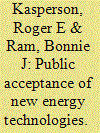

|
|
|
|
|
| Publication |
2013.
|
| Summary/Abstract |
In the wake of ominous results about the impending path of climate change, and with gasoline prices hovering around four dollars per gallon, the 2012 presidential and congressional campaigns are full of claims and counterclaims about the transformation of the U.S. energy system. Although much discussion has centered on the need for new energy technologies, this debate as yet has been narrow and limited. Meaningful deployment of any technology will raise questions of public acceptance. Little is known about how diverse publics in the United States will respond to the advent of new energy sources, whether they involve a "second renaissance" for nuclear power, a dash to embrace hydraulic fracking for oil and natural gas, or emerging prospects for renewable energies like wind and solar power. Yet public acceptance will determine the outlook. Adding further complication is the growing debate about traditional energy sources and the extent to which a fossil fuel - based energy system should continue to be central to the American economy. This essay explores the issues involved in public acceptance of stability and change in the U.S. energy system. We conclude with several recommendations for gaining a greater understanding of the public acceptance quandary.
|
|
|
|
|
|
|
|
|
|
|
|
|
|
|
|
| 8 |
ID:
121034


|
|
|
|
|
| Publication |
2013.
|
| Summary/Abstract |
Actions by individuals and households to reduce carbon-based energy consumption have the potential to change the picture of U.S. energy consumption and carbon dioxide emissions in the near term. To tap this potential, however, energy policies and programs need to replace outmoded assumptions about what drives human behavior; they must integrate insights from the behavioral and social sciences with those from engineering and economics. This integrated approach has thus far only occasionally been implemented. This essay summarizes knowledge from the social sciences and from highly successful energy programs to show what the potential is and how it can be achieved.
|
|
|
|
|
|
|
|
|
|
|
|
|
|
|
|
| 9 |
ID:
121039


|
|
|
|
|
| Publication |
2013.
|
| Summary/Abstract |
This essay notes some of the key institutions created in the twentieth century for the purpose of delivering energy in North America. Those institutions are being challenged by a combination of stresses in three interconnected areas: reliability, economics, and environmental sustainability. The essay argues that these three stresses create an "energy trilemma" requiring institutional reform. We suggest that new and modified institutions can best be understood if we evaluate them along three dimensions: institutional scale, structure, and scope. We consider real-world examples of recent institutions in light of each of these dimensions and note both successes and concerns that those factors illuminate. We conclude by noting that some institutional changes will be organic and unplanned; but many others, including responses to climate change, will benefit from conscious attention to scale, structure, and scope by those engaged in designing and building the energy institutions needed in the twenty-first century.
|
|
|
|
|
|
|
|
|
|
|
|
|
|
|
|
| 10 |
ID:
121041
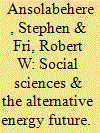

|
|
|
| 11 |
ID:
121036
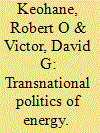

|
|
|
|
|
| Publication |
2013.
|
| Summary/Abstract |
Creating effective energy policy is hard, in part because it often requires effective international coordination. For most salient energy-related issues - such as control of the emissions that cause global climate change or the building of stockpiles to make oil supplies more secure - international coordination is inherently difficult. Solutions lie in making these problems more manageable by working in small groups of relevant countries; successful cooperation also hinges on finding incentive-compatible commitments that align, to the extent feasible, with national interests and are focused on areas where cooperation will yield tangible joint gains. The outcomes of such cooperation efforts are likely to be decentralized complexes of networked institutions rather than integrated, hierarchical treaties that govern a coherently defined issue-area.
|
|
|
|
|
|
|
|
|
|
|
|
|
|
|
|
| 12 |
ID:
121030


|
|
|
|
|
| Publication |
2013.
|
| Summary/Abstract |
There is a consensus among scientists that stark dangers await in a world where the global mean temperature rises by more than about 2 degrees Celsius. That threshold corresponds to a collective human carbon emissions "budget" of around a trillion tons, of which half has been spent. This paper uses a new simulation model to look at strategies to stay within that budget, specifically assessing the impact of improvements in energy efficiency, aggressive deployment of renewables, and energy technology innovation. The simulations examine the timing of investments, turnover of capital stock, and the effect of learning on costs, among other factors. The results indicate that efficiency, renewables, and technology innovation are all required to keep humanity within the trillion-ton budget. Even so, these measures are not by themselves sufficient: changes in land use and a price on carbon emissions are also needed.
|
|
|
|
|
|
|
|
|
|
|
|
|
|
|
|
| 13 |
ID:
121033


|
|
|
|
|
| Publication |
2013.
|
| Summary/Abstract |
Many countries have adopted comprehensive policy frameworks to support renewable energy, but the United States has not adopted any consistent and stable policies at the national level to foster the use of renewable energy. This essay explores why some nations (Germany, China, and Denmark) and certain U.S. states (Colorado, Texas, and Ohio) have developed robust policies for the deployment of renewable energy. My aim is not to evaluate the specific policy mechanisms that countries and states have chosen, but rather to shed light on the underlying societal factors that contributed to each government's decision to enact the policies in the first place. I explore four factors that could influence a government's decision to adopt favorable policies for renewable energy: (1) economic motives; (2) a high endowment of renewable resources and/or a low endowment of nonrenewable sources; (3) the political system; and (4) cultural factors and attitudes.
|
|
|
|
|
|
|
|
|
|
|
|
|
|
|
|
|
|
|
|
|